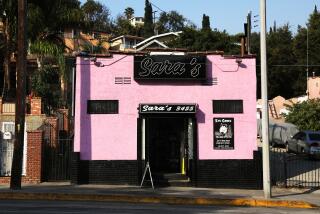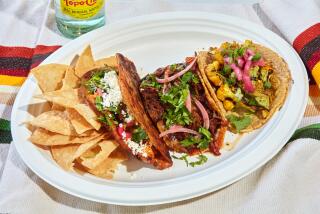Dining at a different type of truck stop
Food trucks aren’t a new thing to Eric Rivera. But when the native Angeleno heard of a new mobile food court opening downtown, he drove all the way from Downey to try it out.
“I’ll be back,” Rivera, 41, said after feasting on a pulled-pork taco. His dining room was a 30-foot table with plastic chairs set up near four food trucks parked in front of the loading docks off Traction Avenue and South Alameda Street.
Portable food courts are the latest trend in the Twitter-fueled gourmet food truck craze, eliminating the need for the typical cat-and-mouse chases around town. Thursday’s event was a test run that vendors hope will address concerns about the vehicles, such as parking, littering and confrontations with restaurant owners, many of whom feel the trucks steal away potential customers.
“We don’t want to make waves,” said Matt Geller, vice president of the SoCal Mobile Food Vendor’s Assn. “We’re trying to keep things on an even keel.”
Geller, who organized the downtown event and is planning future mobile food courts, said he hopes to find property that’s not too close to restaurants.
In August, food truck vendors were told to leave the Miracle Mile along Wilshire Boulevard. In January, vendors set up shop on a former used-car lot in Santa Monica, but the operation was shut down after one day because of zoning issues.
The city is evaluating the merits of allowing food truck vendors to set up shop on a piece of property, said Eileen Fogarty, director of planning and community development for the city of Santa Monica.
Los Angeles City Councilman Tom LaBonge, who represents the Miracle Mile area, said that if the trucks continue to proliferate, it could be bad for neighborhood ambience. If regulations aren’t put into place, too many food trucks could crowd streets and lead to shuttered restaurants.
Daniel Conway, a spokesman for the California Restaurant Assn., said restaurateurs are concerned that customers have a positive experience when purchasing from a mobile vendor.
“We just want to ensure that people know what they’re getting and they are safe and comfortable and happy and enjoy their experience,” Conway said. “We need to have a level playing field for all the folks who are in the business.”
Alex Rocha, general manager of Spitz in Little Tokyo -- not far from Thursday’s mobile food court -- wasn’t concerned by the experiment.
“I feel kind of like the food truck thing has been overdone,” he said.
The vehicles might take some of his business, but they don’t offer the ambience of a restaurant, Rocha said.
“You can go to a restaurant, sit down, get out of your head for a second and go back to work,” he said.
The concept, though, appears to be catching on.
Another lot is planned near the Beverly Center, and truck vendors are expected to assemble during the monthly Downtown Art Walk to ease congestion, Geller said.
Dave Reiss, owner of The Brig, a bar in Venice’s Abbott Kinney district, started letting multiple food trucks use his parking lot in the fall of 2008. To Reiss, having trucks in the lot is almost like a built-in restaurant.
“It almost is a modern food court,” he said.
Molly Taylor, who sells everything from cookies to cupcakes from various L.A. bakers out of her Sweets Truck, said the lots are an added element in the success of the industry -- which, for her, is all about people.
“It’s definitely an opportunity for community,” said Taylor, known on skid row as the “sweet lady.”
Back at the downtown mobile food court, four men in teal and blue scrubs munched on barbecue from a truck.
“It’s better for us,” said David Stempel, a radiologist. “Competition breeds better business.”
More to Read
Eat your way across L.A.
Get our weekly Tasting Notes newsletter for reviews, news and more.
You may occasionally receive promotional content from the Los Angeles Times.











